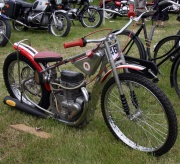Jawa: Difference between revisions
No edit summary |
No edit summary |
||
| Line 1: | Line 1: | ||
[[image:Im201106SMVR-B46.jpg|thumb| 1976 Jawa speedway bike, 500cc. ]] | [[image:Im201106SMVR-B46.jpg|thumb| 1976 Jawa speedway bike, 500cc. ]] | ||
'''Jawa''' is a motorcycle manufacturer in the Czech | '''Jawa''' is a motorcycle manufacturer in the Czech Republic, formerly Czechoslovakia. | ||
It was named after its founder Janeček bought the motorcycle production of ''Wanderer'' in 1929, by concatenating the first letters of Janeček and ''Wanderer''. The company is still active today. | It was named after its founder Janeček bought the motorcycle production of ''Wanderer'' in 1929, by concatenating the first letters of Janeček and ''Wanderer''. The company is still active today. | ||
The first model was introduced on 23 October, 1929. This was a 500cc 4- | The first model was introduced on 23 October, 1929. This was a 500cc 4-stroke engine of 12 kW and fuel consumption of 6 litres per 100km. Although expensive, this motorcycle was successful and was considered to be reliable. | ||
Due to the economic recession of the early | Due to the economic recession of the early 1930s, a cheaper and simpler motorcycle was needed. 1932 marked the introduction of the '''Jawa 175''', with its 3.6 kW engine. This light (70 kg) machine was capable of speeds up to 80 km/h and fuel consumption of 3.5 litres per 100 km. The first year of production was an immediate success, selling over 3,000 of the '''Jawa 175''', almost three times the number of the 500 cc model over three years of production. The production of this model was finally stopped in 1946. In 1938 '''Jawa''' was the first to offer test rides during exhibitions. This test motorcycle was a custom '''Jawa 175''' equipped with dual handlebars, the second pair being in the back for the instructor. Over the years a total of 27,535 units of the '''Jawa 175''' were built. | ||
In 1934, '''Jawa''' introduced its first car. Production continued to at least the outbreak of war, and it appears that a few were assembled from left-over parts in 1944-1945. | In 1934, '''Jawa''' introduced its first car. Production continued to at least the outbreak of war, and it appears that a few were assembled from left-over parts in 1944-1945. | ||
Production of 2-stroke and 4-stroke motorcycles continues today. | |||
A good selection of Jawa products is on display in [[Prague National Technical Museum]]. | A good selection of Jawa products is on display in [[Prague National Technical Museum]]. | ||
Revision as of 08:41, 18 September 2018

Jawa is a motorcycle manufacturer in the Czech Republic, formerly Czechoslovakia.
It was named after its founder Janeček bought the motorcycle production of Wanderer in 1929, by concatenating the first letters of Janeček and Wanderer. The company is still active today.
The first model was introduced on 23 October, 1929. This was a 500cc 4-stroke engine of 12 kW and fuel consumption of 6 litres per 100km. Although expensive, this motorcycle was successful and was considered to be reliable.
Due to the economic recession of the early 1930s, a cheaper and simpler motorcycle was needed. 1932 marked the introduction of the Jawa 175, with its 3.6 kW engine. This light (70 kg) machine was capable of speeds up to 80 km/h and fuel consumption of 3.5 litres per 100 km. The first year of production was an immediate success, selling over 3,000 of the Jawa 175, almost three times the number of the 500 cc model over three years of production. The production of this model was finally stopped in 1946. In 1938 Jawa was the first to offer test rides during exhibitions. This test motorcycle was a custom Jawa 175 equipped with dual handlebars, the second pair being in the back for the instructor. Over the years a total of 27,535 units of the Jawa 175 were built.
In 1934, Jawa introduced its first car. Production continued to at least the outbreak of war, and it appears that a few were assembled from left-over parts in 1944-1945.
Production of 2-stroke and 4-stroke motorcycles continues today.
A good selection of Jawa products is on display in Prague National Technical Museum.
Sources of Information
[1] Wikipedia

